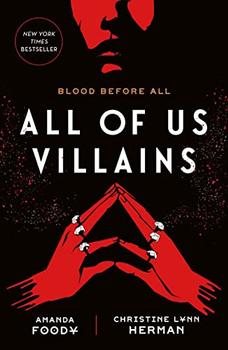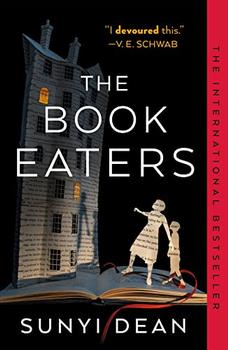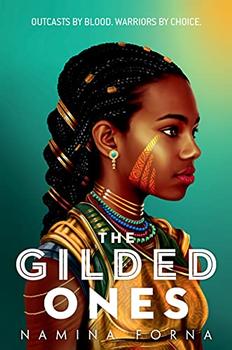Summary | Excerpt | Reviews | Beyond the book | Read-Alikes | Genres & Themes | Author Bio

All of Us Villains #1
by Amanda Foody, Christine HermanAll of Us Villains, the first release of a young adult dark fantasy series by Christine Lynn Herman and Amanda Foody, wastes no time pulling the reader into a tantalizing drama seasoned with betrayal, murder and sacrifice and driven by a cast of strong and compelling characters. Ilvernath, a simplified iteration of the modern world with its enduring cobblestones, chic restaurants and modish department stores, is the setting of an age-old tournament. Seven young champions, each from one of seven dynasties, form what is known as the "Slaughterhouse Seven." Carrying the mantle of their fallen ancestors, their task remains the same: to engage each other in deadly enchanted warfare beyond the town limits in a zero-sum game of kill-or-be-killed until only one contender remains. Awarded to that champion's family is exclusive access to the world's only known reserve of powerful "high magick" and all the prestige, prosperity and political dominance conferred with it for the next 20 years. After that time, the tournament resets and a new generation of champions must repeat the bloodshed. Whether they are willing or forced to defend the family name, there is no escape for the chosen Seven.
The course of events is organized in short chapters that rotate in no specific order between the viewpoints of four primary characters within the Slaughterhouse Seven: Alistair Lowe, Isobel Macaslan, Gavin Grieve and Briony Thorburn. The hardships they face from all sides, be they fractured relationships or relentless gaslighting by borderline abusive parents, are compounded by their feelings of loneliness and entrapment within the predestined role of champion. The common chord they share is that of personal tragedy, the details of which are revealed for each character bit by bit through unembellished prose: Alistair, the night monster. Isobel, the reluctant warrior. Gavin, the underestimated scapegoat. Briony, the tragic hero. Irrespective of which character(s) readers choose to adore and cheer on, they will watch with anticipation as each champion faces their mortality and the compulsion of their own dark nature.
Notwithstanding the centrality of magick, spells and curses, All of Us Villains is foremost a teenage drama backed by heavy character development. It is a tale of constantly shifting alliances, ineluctable betrayal and inconvenient secrets that hold potential sway in the tournament's outcome. Readers should not expect the atmospheric charm of Hogwarts or the romanticism of Isengard. Everyday life in the town of Ilvernath appears much the same as ours, though readers will be quick to note the unspoken absence of smartphones and social media. It is a world where teenagers listen to music on CD players and rely largely on face-to-face contact. In this reality, the existence of "magick" (see Beyond the Book) serves two fundamental purposes: common (low) magick is a technological stand-in for devices, gadgets and weapons; it is a mass-produced commodity ranging from an instant cure-all for an alcoholic hangover or oversized face zit to hellfire on demand that can rip the human body in half if executed by a disciplined curse-thrower. High magick, on the other hand, is even more terrifyingly powerful and cloaked in mystery. It is both the key to uncontested political authority for the family wicked enough to wield it, and the very cornerstone of the Blood Veil tournament by which generations are bound in an inviolable supernatural pact.
Physical and supernatural violence is prominently touched upon throughout the story, and psychological terror (e.g., children's horror tales) is addressed to a lesser extent. Descriptions of death and physical maiming are not exceedingly explicit, but they are sufficient to give the uninitiated pause. Once the high magick of the tournament has torn the champions away from the protective barriers of the city and their families, the rosy romanticism of conquest and glory implanted by years of training lose meaning in an ugly, blood-and-muck reality where virtue and good intentions succumb to baser urges. Readers who enjoy the thrill of carnage and curses that tear and impale will not be disappointed.
Thematically, the narrative embodies to a large extent a retelling of the classic plot of the tragic hero, in this case subverted to fit the titular villains. These champions of the story are groomed by their families from birth to become unremorseful agents of death. It becomes clear, as we get to know each of their backgrounds, that no one entirely chose to be this way. The disconnect between the characters' free will and fate inevitably leads to conflicts of personal identity, which the book explores at length. Is Alistair, for example, really the deadly, demonic monster his elders have inculcated, or is there something more, perhaps even virtuous, to his character? Similar questions haunt the other champions as circumstances force them to examine their own sense of purpose. They discover in the process that, like violence, identity is power. When someone stops knowing who they are, they become weak and easy to manipulate.
In addition to its immersive storytelling and fleshed-out characters, All of Us Villains succeeds brilliantly in its telling of romantic love. To the credit of the authors, they resist the temptation of turning the featured relationship into a distracting focal point, instead exploiting it as a critical window into key emotional vulnerabilities not even the characters involved are aware of initially. Perhaps not all villains are completely evil after all. But even so, is love or good intentions enough to conquer a metaphysical force that has cursed generations of families? Is it enough to conquer one's own instinctual will-to-power or sense of fate? Adding to these mounting questions are a series of developments and twists, which at just the right moment alter everything the reader has so far presumed about the main characters and their circumstances. At the same time, external influences and adversaries lurk in the background, each vying to manipulate the Blood Veil tournament and its impressionable participants to their own ends. Rules change without apparent reason. Some cheat. Others die. Though All of Us Villains is only the first book in a series still in development at the time of writing, the reader can rest assured that the next exciting installment is well worth the cliffhanger and the wait.
![]() This review was originally published in The BookBrowse Review in January 2022, and has been updated for the
August 2022 edition.
Click here to go to this issue.
This review was originally published in The BookBrowse Review in January 2022, and has been updated for the
August 2022 edition.
Click here to go to this issue.

If you liked All of Us Villains, try these:

by Sunyi Dean
Published 2023
Sunyi Dean's The Book Eaters is "a darkly sweet pastry of a book about family, betrayal, and the lengths we go to for the ones we love. A delicious modern fairy tale." - Christopher Buehlman, Shirley Jackson Award-winning author.

by Namina Forna
Published 2022
The most anticipated fantasy of 2021. In this world, girls are outcasts by blood and warriors by choice. Get ready for battle.
If you want to build a ship, don't drum up people... but rather teach them to long for the endless immensity of the...
Click Here to find out who said this, as well as discovering other famous literary quotes!
Your guide toexceptional books
BookBrowse seeks out and recommends the best in contemporary fiction and nonfiction—books that not only engage and entertain but also deepen our understanding of ourselves and the world around us.